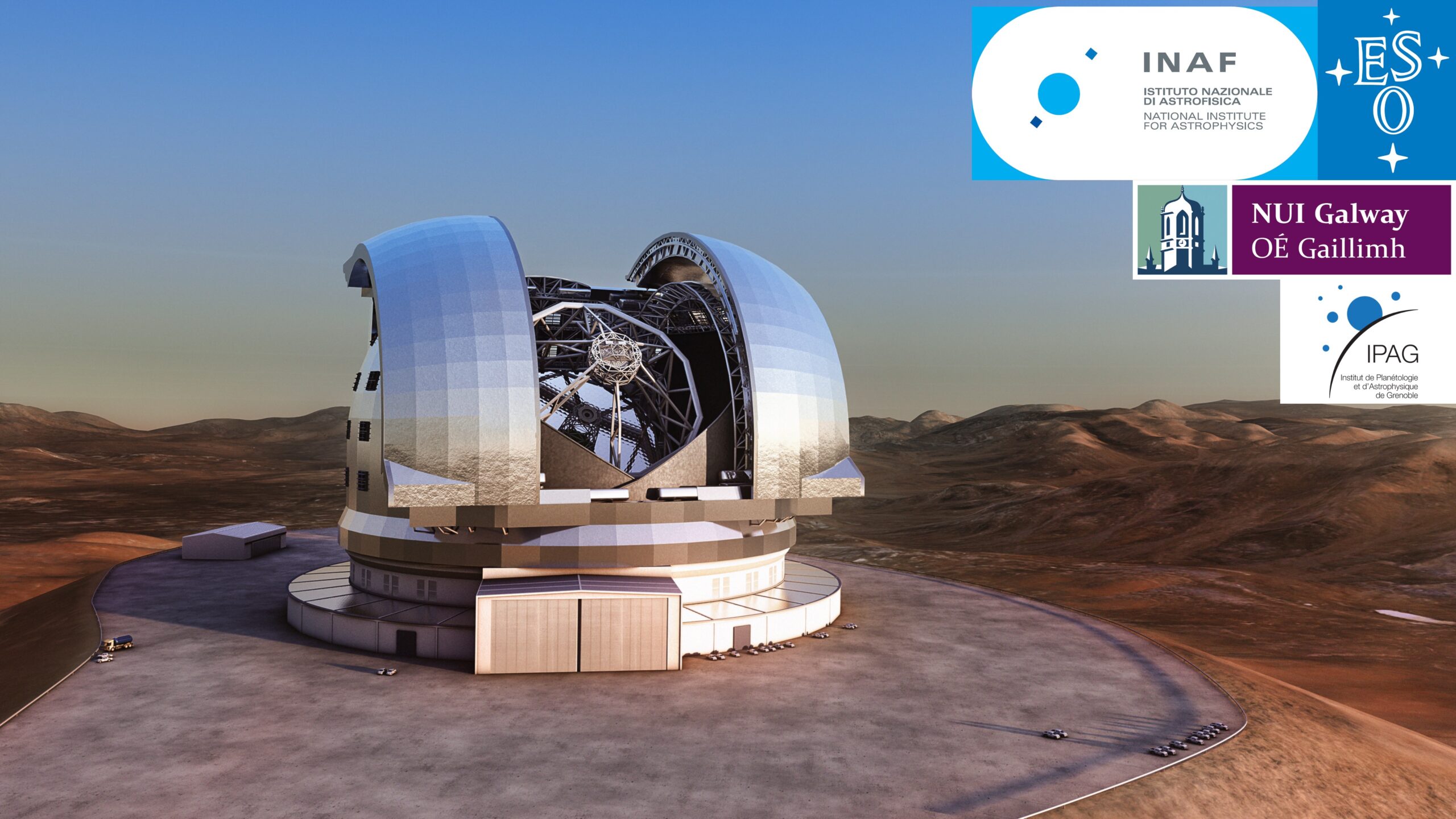
MORFEO (formerly know as MAORY) , the Adaptive Optics Module for ELT
ELT (Extreme Large Telescope, see elt.eso.org for more info) is the world’s largest telescope under construction (39 m diameter) and it is considered worldwide to be one of the highest priorities in ground based astronomy. ELT will lead to a greater advancement of astrophysical knowledge, allow a deeper exploration of our Universe, and give sharper views of cosmic objects than ever before.
MORFEO as first generation ELT instrument, will help compensate for the distortion of light caused by turbulence in the Earth’s atmosphere which make astronomical images blurry (Adaptive Optics, see here for more information on Adaptive Optics).
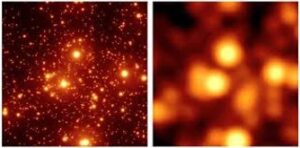
Astronomical image of a crowded stellar field with Adaptive Optics (Left Panel) and without Adaptive Optics (Right Panel)
MORFEO is built by a consortium of 3 institutes : INAF (7 Institutes in Italy) IPAG (Grenoble France) , NUIG (Galway , Ireland). INAF is the leader institute.
MORFEO will enable to take extremely high-quality images of the cosmos. See ESO web page dedicated at MORFEO at https://elt.eso.org/instrument/MORFEO/ or the MORFEO Consortium web page for more details.
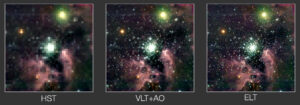
This illustration aims to show how the nebula NGC 3603 could be seen by three different telescopes: the NASA/ESA Hubble Space Telescope, ESO’s Very Large Telescope with the help of its adaptive optics modules, and the Extremely Large Telescope. NGC 3603 is a star-forming region in the Carina spiral arm of the Milky Way, 20 000 light-years away from Earth. Credit: ESO, Adaptive Optics web page
Science Drivers
Coupled with MICADO, MORFEO will enable ELT to perform diffraction limited near infrared observations. In imaging mode MORFEO+MICADO will provide an option with a wide FoV (50.5 x 50.5 arcsec2) at pixel scale of 4 mas and a high resolution option with 1.5 mas pixel scale over 19×19 arcsec2. This will allow a major step forward, with a significant increase in spatial resolution with respect to HST and even JWST (pixel scale ~ 30mas/pix). Long slit spectroscopy will be covered with two settings: a short slit 0.84-1.48 μm, and a long slit from 1.48-2.46 μm.
The science cases for the MORFEO+MICADO have been widely explored by the MORFEO science team. A preliminary collection of the cases studied is reported in the MORFEO science cases white book free available on the MORFEO website.
The collected science cases address many of the major questions of astrophysics :
- Planetary systems including cases in our own Solar Systems , exoplanet and formation of planetary system
- Nearby stellar systems with stars and stellar systems within our own Galaxy and its satellite
- Local Universe with science cases aimed to study the stellar content and the structure of distant stellar systems that can be at least partially resolved into individual stars. In many cases they will fall within the range of resolved systems only thanks to the advent of MORFEO+MICADO
- High-redshift Universe with the science cases addressing the formation of structures and cosmology using the formidable sensitivity and resolution of MORFEO+MICADO to probe the very distant Universe and, consequently, the earliest phases of galaxy formation, as well as high energy phenomena over the range of cosmic distance and times made accessible by ELT.
Below we show a combination of real and simulated images selected from the MAORY White book, to illustrate the extreme capability and versatility of the coupled MAORY+MICADO.
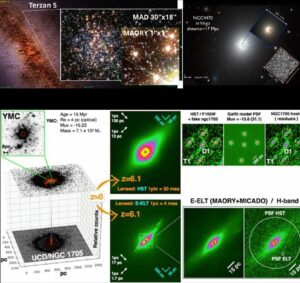
Combination of real and simulated images from the MAORY white book. Top left: Terzan 5 as imaged by MAD at VLT and by MAORY/MORFEO+MICADO. Top right: NGC 4470 as imaged by HST and MAORY/MORFEO+MICADO. Bottom panel: 2D and 3D HST images of NGC1705 and simulations at HST and MAORY+MICADO resolution lensed at z=6.1. (Vanzella et al. 2019)
The instrument
A general overview of the MORFEO architecture is shown below. The main hardware subsystems indicated in the figure are complemented by the electronic at system and sub-systems level, instrument control software and real time computer.
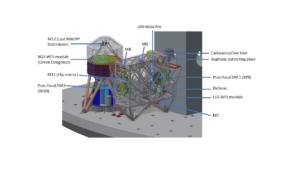
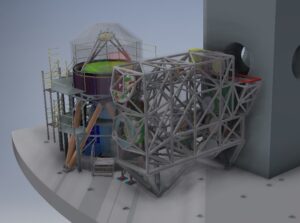
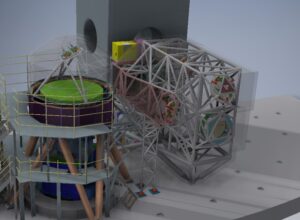
General overview of the MAORY instrument (thermal cover in transparency) installed on the Nasmyth platform with MICADO
MORFEO @ INAF OAS
MORFEO is the largest ground based astronomical project in INAF.
INAF OAS is strongly involved in the MORFEO project. Several INAF OAS staff member are full time involved in the MORFEO project, including the MORFEO Principal Investigator and MORFEO Project Manager. Moreover MORFEO will be fully integrated and tested at INAF OAS (laboratories in CNR Area) before being shipped at Cerro Armazones in Chile’s Atacama Desert.
Publications
Here there is a list of MAORY/MORFEO publications
